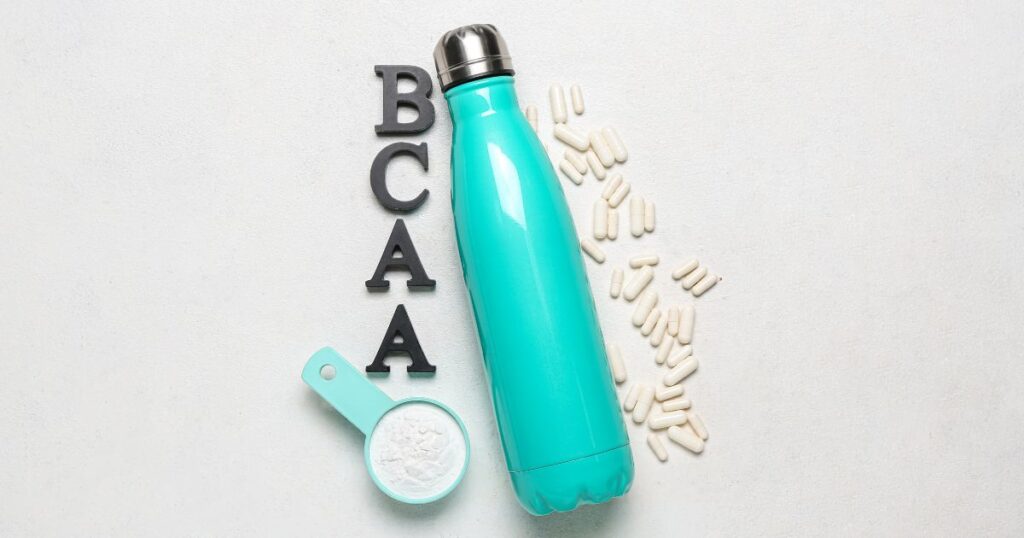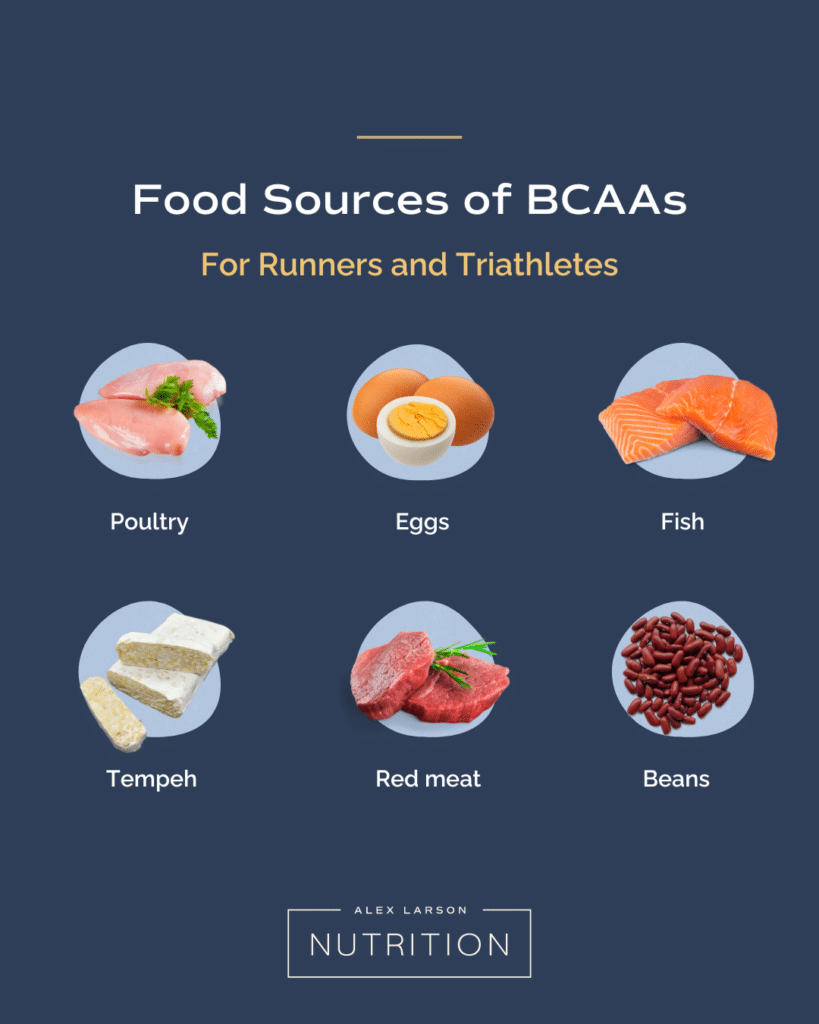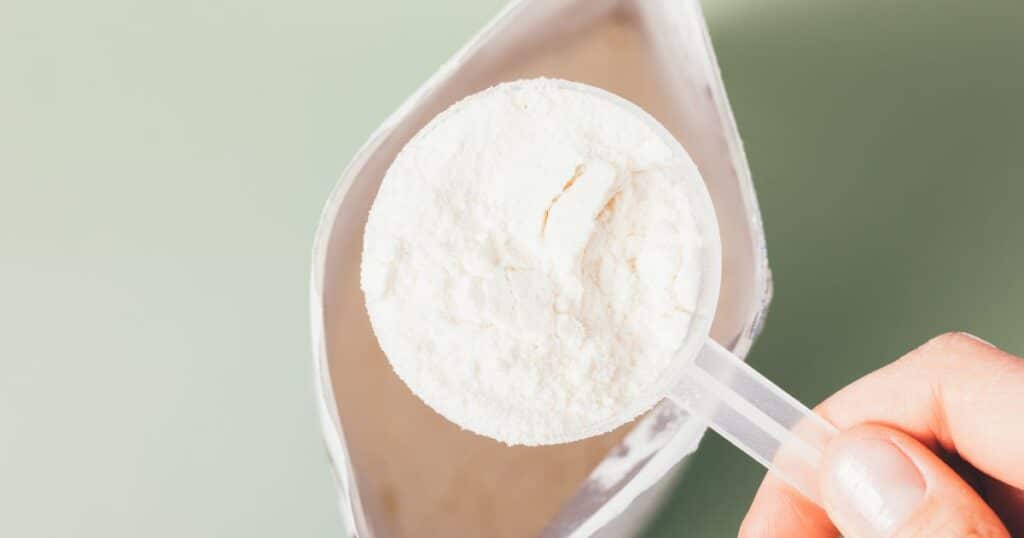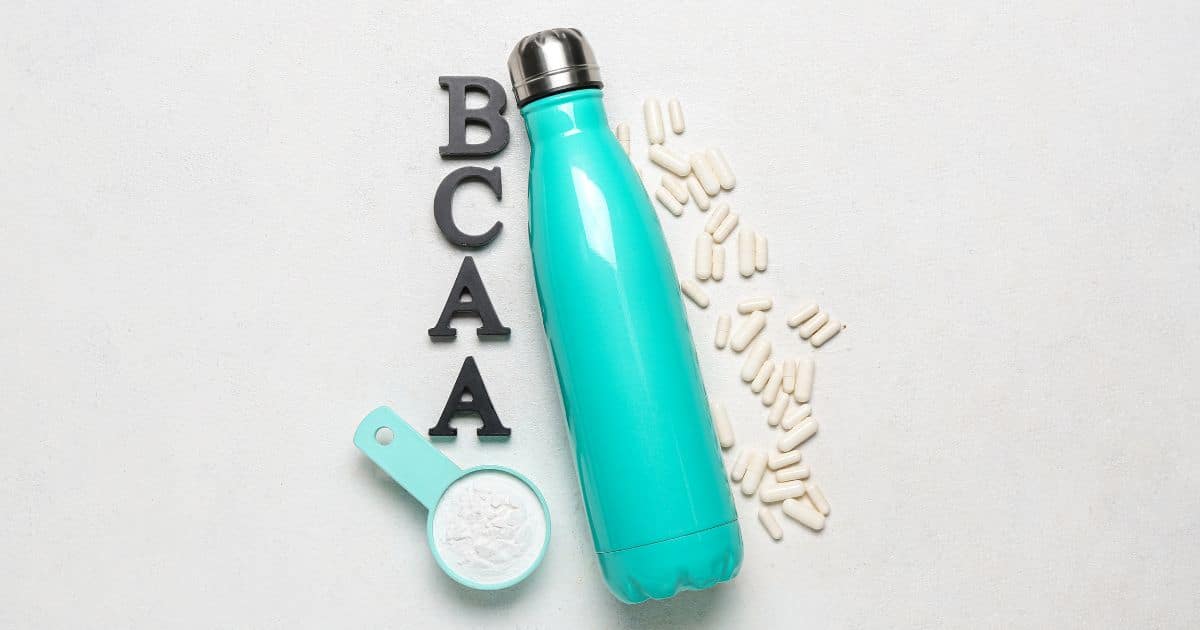RUNNING →
Level Up Your Nutrition Game With Our Freebies
Alex
I provide nutrition coaching for endurance athletes to improve performance and body composition through a simple and flexible eating style.
Hi, I'm
ATHLETE EATING GUIDE →
PROTEIN →
TRIATHLON →
RECIPES →
PERFORMANCE NUTRITION →
SUPPLEMENTS →
HOLIDAY & TRAVEL →
PLANT-BASED →
FEMALE ATHLETE NUTRITION
Explore the Blog
LEARN MORE →
ATHLETE GROCERY SHOPPING GUIDE →
10-DAY PROTEIN-PACKED SAMPLE MEAL PLAN
READY TO FUEL?
incredible value!
The fueling guide bundle serves as your one-stop-shop for strategies to fueling before, during and after your workouts.
Branched-chain amino acids (BCAAs) are an essential part of an endurance athlete’s nutrition plan. These specific amino acids play a significant role in muscle protein synthesis and energy production, important for athletes who are covering long distances. BCAAs for runners offer potential benefits like reduced muscle fatigue, accelerated recovery, and decreased muscle soreness post-workout.
Great news– there is a very good chance you are already optimizing your BCAA intake, even without taking marketed fancy supplements. Incorporating BCAA-rich food sources is an important part of an endurance athlete’s nutrition plan to optimize performance and can be easily done!
My dietitian team and I always encourage a flexible and foods-first approach before considering any nutrition supplement, BCAA supplements included. Let’s dive in further and uncover the importance of BCAAs for runners and triathletes.
What are BCAAs?

BCAAs, in particular, are three essential amino acids: leucine, isoleucine, and valine, and must be obtained through food sources or nutrition supplementation.
Amino acids are considered the building blocks of protein. When proteins are digested and broken down, amino acids are the result.
BCAAs play a crucial role in muscle protein synthesis, energy production, and can potentially reduce muscle soreness and fatigue after exercise. BCAA supplements are often consumed by athletes to support muscle recovery and improve exercise performance. Endurance athletes often subject their bodies to prolonged physical stress, leading to muscle damage and fatigue. BCAAs have also been well-researched in:
- Helping delay fatigue
- Supporting faster recovery
- Reducing muscle soreness post-exercise
- Offsetting muscle tissue losses
Muscle Recovery and Repair
BCAAs are essential amino acids that play a vital role in muscle recovery and repair. Research suggests that consuming BCAAs, especially following intense exercise, may help reduce the onset and severity of muscle soreness, commonly referred to as delayed onset muscle soreness (DOMS). This potential reduction in soreness can assist athletes and fitness enthusiasts in maintaining consistent training schedules, improving exercise recovery, and enhancing overall workout performance.
Though preliminary, some research has shown no effect of supplementing with BCAAs before and during longer duration efforts, such as within a 100km running race. There are no measured differences in performance outcomes or skeletal muscle damage.
BCAAs for Runners – Incorporating into Your Training

As a sports dietitian, I always encourage a foods-first approach to nutrition. In this instance, it means optimizing BCAA-rich food sources before considering any nutrition supplement. Fortunately, this can be easily done and BCAA-rich foods offer other valuable nutrition qualities.
To naturally integrate these amino acids into one’s diet, several foods are notably rich in BCAAs. Lean meats such as chicken, turkey, and beef are excellent sources. Fish, especially salmon and tuna, contain significant amounts of these amino acids. Eggs, particularly the whites, are also packed with BCAAs.
In general, many athletes fall short of their protein targets regularly, but meeting those needs doesn’t need to be overcomplicated. If you are constantly falling short of meeting your protein needs, consider topping your toast with an egg (or two), adding lean beef to my favorite marinara recipe, or refueling post-workout with a smoked salmon and avocado bagel. It doesn’t need to be overwhelmingly cumbersome or complicated to sneak BCAAs into your routine regularly.

BCAAs for Plant-Based Runners and Athletes
For plant-based endurance athletes, optimizing BCAA intake is just as important as it is for meat eaters. Quinoa, tempeh, and beans, especially black beans and lentils, are high in BCAAs. Incorporating these foods can provide the necessary BCAAs for muscle repair and overall health without relying solely on supplements. Be sure to regularly include these foods in your meal planning and preparation routine!
BCAAs for Runners – Supplements
BCAA supplements for runners and triathletes are typically not necessary so long as you are otherwise including protein-rich foods at your meal and snack times. Though protein powder can be an easy and convenient option for boosting protein intake.
One of the most common types of protein powders available is whey. It’s a dairy-based protein and is considered one of the highest-quality proteins as it contains all nine essential amino acids, and is also an excellent source of the amino acid leucine. Leucine is well-researched and plays the role of signaling the body to start building muscle.
If you are a plant-based athlete, soy-based protein also consists of a substantial amount of BCAAs.
BCAA supplements are also available in capsule or powder form. Between 4-20g per day is the recommended dosage though there are not specific recommendations for long-term usage. These supplements typically supply as much leucine as isoleucine or valine, which is sometimes referred to as a 2:1:1 ratio. This is because leucine may be especially good at stimulating protein synthesis and preventing the breakdown of muscle protein.
There is no overwhelming research to support that BCAA capsules or powders are superior to optimizing intake through whole protein powders and whole protein-rich food sources.

Protein Powders for Runners and Triathletes
Protein powder provides a quick, convenient solution for optimizing protein intake, especially when you’re on the go and need something portable. Choosing a quality protein powder will offer a concentrated and easily digestible protein source. They’re designed to be absorbed quickly and deliver the needed amino acids to your recovering muscles.
I’m a big fan of Thorne (whey and plant-based options) supplements. I love Thorne’s whey protein isolate powder and this link will get you 15% off your order (discount applies at checkout). Be sure to check out our protein powder post for other options, including protein bars.
Protein powders come in a variety of forms. When reviewing ingredient labels, look for protein isolates as that indicates it will be 90%+ protein. The ingredient list says protein concentrate which can vary anywhere from 30-89% depending on the brand.
Whey protein is the most popular due to its superior amino acid profile and it’s well-known for being quickly absorbed. Casein protein is a slow-release amino acid and makes a great option for bedtime to support muscle recovery overnight. And plant-based protein powders will vary in quality. Plant-based powders will often have a variety of sources to get a more diverse amino acid profile. They also may have additives such as digestive enzymes to increase absorbability.
BCAAs – Potential Side Effects and Considerations
As with any nutrition supplement, it is important to discuss it with your medical care provider before starting. Some nutrition supplements have the potential to do more harm than good. If you are opting for a BCAA supplement in the capsule form, it is important to choose one that is third-party tested such as Informed Choice for Sport or NSF Certified for Sport.
In a recent study published, it was reported that more than 28% of the analyzed dietary supplements posed a risk of unintentional doping. The contaminated products originated all over the world, mostly from the U.S., but also from the Netherlands, UK, Italy, and Germany. Some of the samples originated in China and Southeast Asian countries.
Foods first, always
There is no single performance-enhancing supplement that will give you an overwhelming competitive edge versus focusing on your overall nutrition intake to do so.
Are you feeling lost when it comes to performance nutrition? Are you ready to hit that next PR on race day? Working with a specialized sports dietitian is one of the best ways to maximize your performance as an athlete.
We have limited spots available for our premium 1:1 nutrition coaching services. Make sure to apply today to secure your spot just in time for your next big race! There is no better time to invest in your health.
Alex
I provide nutrition coaching for endurance athletes to improve performance and body composition through a simple and flexible eating style.
Hi, I'm
LEARN MORE →
take the quiz!
Let's discover your Endurance Nutrition IQ
How well do you know your fueling? Answer these questions and let's see where your endurance nutrition knowledge is at!
Take the quiz
level up your nutrition game with these freebies
free downloadS
Protein-Packed 10-Day Sample Meal Plan
Athlete Eating Guide
Athlete Grocery Shopping Guide
1
2
3
Inspiration to fit 120 grams of protein into your day
Planning what goes on your plate
Putting the right foods in your grocery cart
